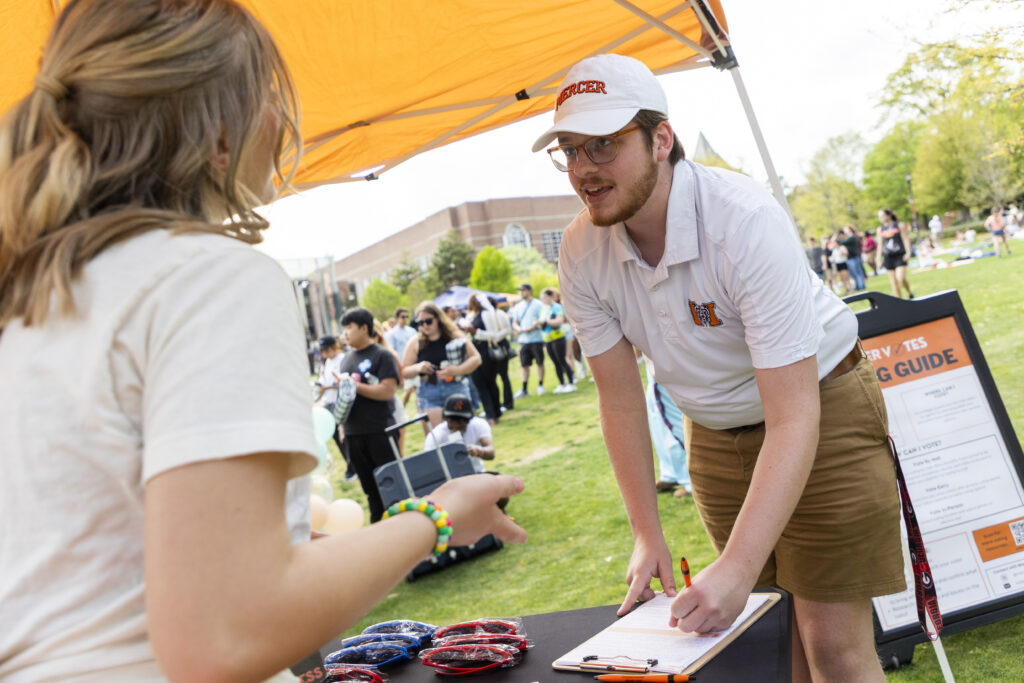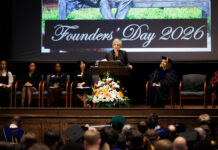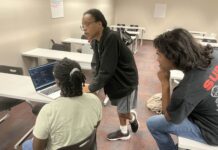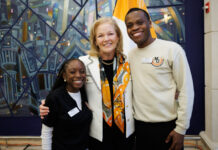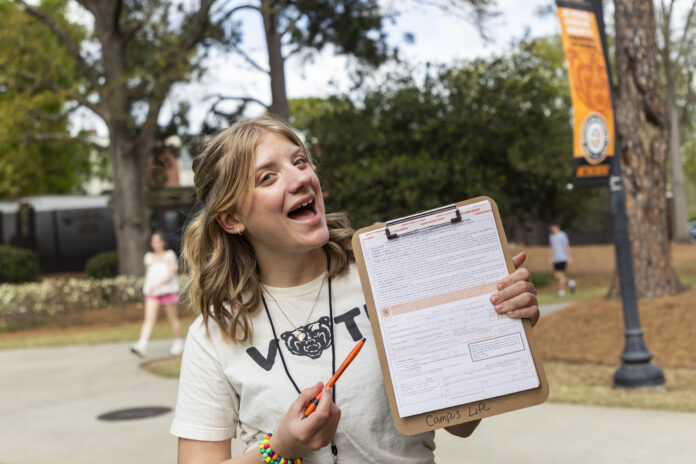
Amid the many traditions at Mercer University, civic engagement has emerged in recent years as a powerful addition. Through purposeful action plans, a culture of student voter participation has become embedded in the undergraduate college experience.
Staff, faculty, community members and peers help students discover why their voice matters during discussions in the classroom and activities on campus.
“Mercer really likes to pride itself in the cohesive integration of a lot of our initiatives, especially when we talk about civic engagement in the co-curricular life and blending it with the academics,” said Margaret Rooyakkers, assistant director of service and civic engagement. “I think it’s really important that civic engagement isn’t siloed. Civic engagement is ongoing. We want to make sure we’re encouraging a culture of participation.”
Mercer Votes is the name of the University’s overarching program supporting nonpartisan voter engagement, and a number of initiatives under it work together to educate students, said Lauren Shinholster, associate director of engaged learning. The goal is for students to see the University’s emphasis on civic engagement from day one of their Mercer experience.
Mercer Votes representatives can be found on campus providing nonpartisan voter engagement information during Mercer events like Opening Days, BearStock and Be a Good NeighBear and during civic holidays like National Voter Registration Day, Vote Early Day and Election Hero Day. They host an annual Civic Engagement Week — Sept. 15-20 this year — which offers activities that combine service and voter engagement, Rooyakkers said.
“We tie the fun in with talking about civic engagement, so it’s everywhere students look,” Rooyakkers said.
Mercer Votes also coordinates debate watch parties, election night parties and guest speaker events. For instance, Macon-Bibb County Commissioner Stanley Stewart will talk about his civic engagement journey at 10 a.m. Sept. 17 in Willet Auditorium, an event being hosted in partnership with Mercer Leadership Fellows.
During the 2024-25 year, Mercer Votes piloted a faculty engagement initiative that provided voting resources to more than 90 Mercer classes, Shinholster said. Rooyakkers said professors may be apprehensive to broach the subject of politics, so the program provides a slideshow and resources to help them have nonpartisan discussions with their students.
Forty faculty and staff members have already signed up to participate in the program — recently named “Voter Engagement Champion” — for the 2025-26 year. Shinholster said her team hopes to expand its reach on Mercer’s Atlanta campus and regional academic centers in the future.
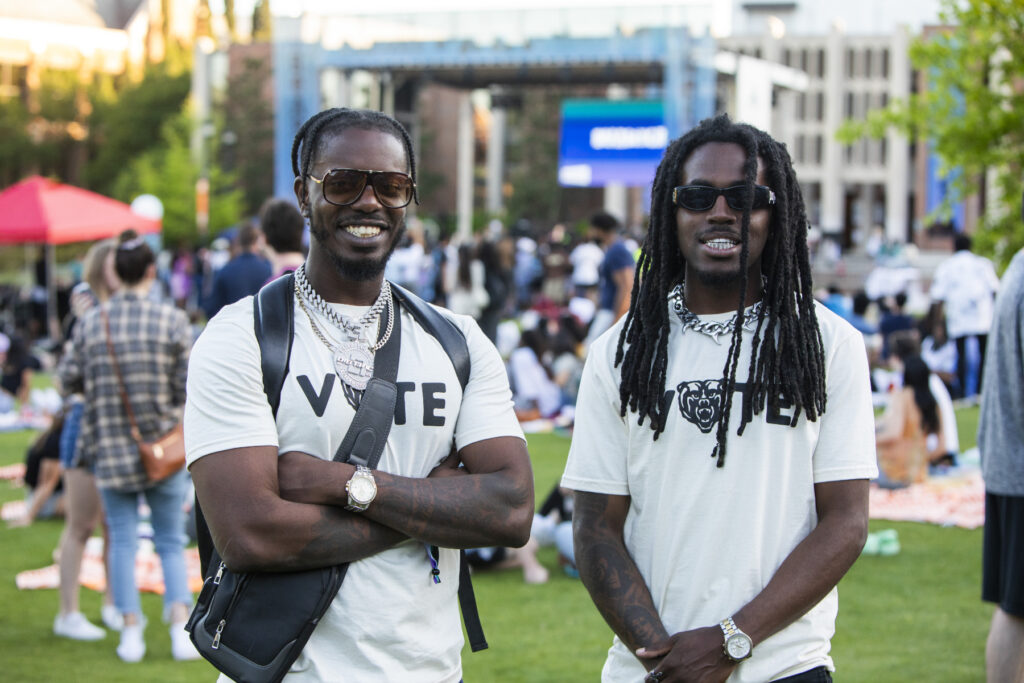
Each year, a few students employed as Mercer Votes Ambassadors and Campus Vote Project Democracy Fellows assist with these voter engagement activities. Junior Harris Wallace, a philosophy, politics and economics major, served as a Democracy Fellow last year and has been an intern with the Campus Vote Project since the summer.
“Even in high school, I was hosting elected officials before midterms. It’s been important to me to get people thinking about politics,” Wallace said. “I picked up (an interest) on voting rights in particular.”
First-year and transfer student-athletes also contribute to Mercer Votes’ outreach efforts through the University’s life skills program. They are required to take two courses, one focusing on skills to adjust to college life and the other on community connections. During the latter, they participate in a community service opportunity, with one of their options being to work with Mercer Votes. Student-athletes are essential to the success of the spring “Pledge the Vote” campaign, Shinholster said.
Mercer has become a national leader for student voter engagement, receiving numerous awards in recognition of its strategic efforts. Among its accolades are the ALL IN Campus Democracy Challenge’s highest voter turnout award among Southern Conference institutions in 2016, 2018 and 2022 and designation as a “voter friendly” campus in 2023. Mercer Votes also received grant funding from the Ask Every Student national initiative for 2024, 2025 and 2026.
“It’s really a driving force, a rallying tool for the work we do,” Shinholster said of these awards. “Having these national and regional recognitions also means that we have more partners and are able to get additional support. All of it really points to capacity building.”
Another big part of Mercer Votes’ work is helping students see how civic involvement and awareness are important every year, not just during presidential elections. Students are affected by the results of all elections, whether local or national, and they can have an impact on the causes that are important to them, Rooyakkers said.
“The theme this year is that voting doesn’t take time off,” Wallace said. “In Georgia, we really do have elections pretty much every single calendar year. We still are voting on really important positions. Your decision that you make at the ballot box is influenced by everything that you’re hearing about politics over the course of that two or four years before the vote.”
Wallace said the Mercer Votes’ work encourages and empowers students and helps them become engaged at a deeper level. It gives them a better understanding of why their vote matters and shows them the importance of doing their own candidate research.
“There’s always something going on that students can be invested in, so (we are) making sure that they are civically aware that voting is just one aspect of being involved,” Shinholster said. “It’s also making sure that they are engaged in the experience and know what impacts them day to day.”
